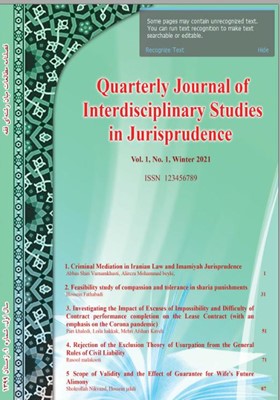Contradiction of the Transferred intention Doctrine with the Principle of Minimum Criminal Law
Subject Areas : فصلنامه مطالعات میان رشته ای فقه
1 - Faculty member, Department of Law, Pardis Branch, Islamic Azad University, Tehran, Iran.
Keywords: Intention, principle, doctrine, minimum, transferred,
Abstract :
AbstractThe purpose of this paper is to measure the fundamental contradictions of the transferred intention doctrine to the principle of the so-called minimum criminal law. The Camen-Louie Transformation Plan aims to criminalize the transferability of the criminal intention, arguing that criminal misconduct is capable of transferring from The purpose of the victim is incidental and the inadvertent intention of the original offender does not eliminate the unwanted consequences, but the criminal nature of the victim's intent does not preclude the criminal intention of the original purpose and its linkage to the result of a goal or identity error beyond the heart's desire and Mentally committing certain results will suffice to impose the punishment of deliberate victimization.The maximum magnitude of this approach focuses on the development of the scope of intentional crimes and the increase in the level of intervention of actors in the field of criminal policy in describing the rule of law and determining the scope of criminal responses. The findings of this study indicate that the current approach to some of the principles of criminal law Modern, especially liberal discourse Minimizing the scope of criminal law interventions that seeks to limit the powers of the criminal systems in describing the law and the abidance of anti-social behaviors is a clear contradiction. The scale of this conflict is such that it can lead to a weakening of efficiency or neutrality Establishing an optimal response policy for governments in breach of sanctions Laqy and the community as far as the implementation of these two propositions in a penal system unit, conflict and the duality in policy making will face criminal.
_||_


